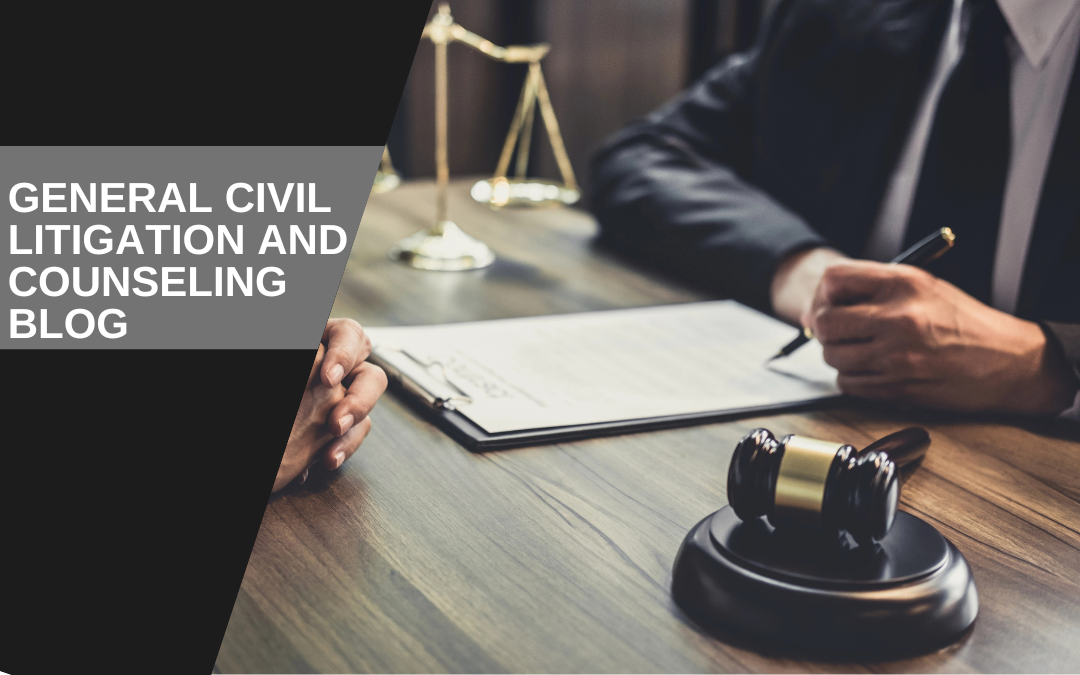
Frequently Asked Questions (FAQs) About General Civil Litigation and Counseling
What is Civil Litigation?
What Are the Stages of Civil Litigation?
Civil litigation generally progresses through several key stages:
- Pre-Litigation: Initial discussions or negotiations between parties, often with the goal of reaching a settlement before formal legal action.
- Filing a Complaint: The plaintiff files a complaint with the court, outlining the case and the relief sought.
- Discovery: Both parties gather evidence through depositions, interrogatories, and document requests to build their cases.
- Motions: Parties may file motions, such as motions to dismiss or for summary judgment, to resolve issues before trial.
- Trial: If the case isn’t resolved, it goes to trial, where evidence is presented, and a verdict is reached.
- Appeal: If dissatisfied with the outcome, a party may appeal the decision to a higher court.
Understanding these stages is crucial for effective litigation strategy.
What is the Role of a Civil Litigation Attorney?
What Are Common Types of Civil Litigation Cases?
How Can I Prepare for a Civil Litigation Case?
Preparing for a civil litigation case involves several steps:
- Gather Documentation: Collect all relevant documents, contracts, communications, and evidence related to the dispute.
- Identify Witnesses: Compile a list of potential witnesses who can support your claims.
- Consult an Attorney: Seek legal advice to understand your rights, potential claims, and strategies.
- Outline Your Goals: Clearly define your objectives, whether seeking monetary compensation, specific performance, or resolution of a dispute.
- Stay Organized: Maintain an organized record of all communications and documents related to the case to facilitate the litigation process.
Proper preparation can significantly enhance your chances of a favorable outcome.
What is Discovery in Civil Litigation?
Discovery is a crucial phase in civil litigation where both parties exchange information and evidence relevant to the case. This process allows each side to gather facts, assess the strengths and weaknesses of their arguments, and prepare for trial. Discovery tools include:
- Interrogatories: Written questions that one party sends to the other, requiring written responses.
- Depositions: Oral questioning of witnesses or parties under oath, recorded for later use.
- Requests for Production: Formal requests for documents, emails, or other evidence.
- Requests for Admissions: Requests to admit or deny specific facts to streamline issues for trial.
Effective discovery is essential for building a strong case and may reveal critical information that can influence settlement negotiations or trial strategy.
What Are Civil Litigation Costs?
Civil litigation costs can vary significantly depending on the complexity of the case and the legal strategies employed. Common costs include:
- Attorney Fees: Charged hourly or as a flat fee, depending on the attorney’s experience and the case’s complexity.
- Court Fees: Charges for filing documents, motions, and other administrative costs.
- Discovery Costs: Expenses related to obtaining evidence, including deposition costs and document production.
- Expert Witness Fees: Payments for experts who provide testimony or analysis relevant to the case.
- Miscellaneous Costs: Travel expenses, photocopying, and other administrative expenses.
Understanding these costs is vital for effective budgeting and planning throughout the litigation process.
How Long Does a Civil Litigation Case Take?
The duration of a civil litigation case varies based on factors such as case complexity, jurisdiction, and whether it proceeds to trial. Simple cases may be resolved in a few months, while more complex cases can take several years. Key factors affecting timelines include:
- Discovery Phase: This can extend the case duration, especially if extensive evidence gathering is required.
- Motions: Pre-trial motions can delay proceedings as courts schedule hearings.
- Trial Scheduling: The availability of court resources and scheduling can impact trial dates.
- Settlement Negotiations: Efforts to reach a settlement may prolong or shorten the overall timeline.
Consulting with an attorney can help set realistic expectations regarding your specific case.
Can I Settle My Civil Litigation Case Before Trial?
What Should I Do If I’m Sued?
If you are sued, take immediate action:
- Review the Complaint: Understand the claims being made against you.
- Consult an Attorney: Seek legal advice to evaluate your options and potential defenses.
- Gather Evidence: Compile relevant documents and information related to the dispute.
- Respond Promptly: Adhere to any deadlines for filing a response or motion in court to avoid default judgments.
- Consider Settlement: Explore potential settlement discussions to resolve the matter amicably.
Timely and informed actions can significantly impact the outcome of your case.
These articles are for general informational purposes only and are not legal advice. Contact us today to discuss your specific situation.
